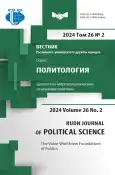Platform as a Factor of Digital Imperialism in the Russian Information Space
- Authors: Martyanov D.S.1,2, Lukyanova G.V.1,2
-
Affiliations:
- Institute of Scientific Information for Social Sciences of the Russian Academy of Sciences (INION RAN)
- St Petersburg University
- Issue: Vol 26, No 2 (2024): The Value-Worldview Foundations of Politics
- Pages: 425-435
- Section: VALUES IN COMMUNICATION PROCESSES: SEMANTIC AND TECHNOLOGICAL ASPECTS
- URL: https://journal-vniispk.ru/2313-1438/article/view/322440
- DOI: https://doi.org/10.22363/2313-1438-2024-26-2-425-435
- EDN: https://elibrary.ru/LPRLXQ
- ID: 322440
Cite item
Full Text
Abstract
The digital imperialism is a modern dimension of classical economic imperialism and uses tools such as digital platforms to disseminate information and accumulate and call financial capital from countries of the periphery to the center. Digital imperialism as a concept is a continuation of the theories of cultural imperialism and media imperialism and, in turn, became the basis for the development of the concepts of platform and blockchain imperialism. The article analyzes the conceptual aspects of the study of modern dimensions of imperialism and provides a brief overview of research directions in this area. The purpose of this study is to identify the role of platforms as a factor in political discourse in the context of digital imperialism. The authors formed the sample based on 2 criteria: the type of platform (global, national and liminal) and the type of communicator (institutional - i.e. mass media channels or personal, i.e. influencer channels). The study covered the period from February 2022 to November 2023 and included 60 media across 3 platforms. The analysis was carried out using 4 research methods. The results of the analysis demonstrate that YouTube, Telegram and Vk.com are characterized by different discourse and agenda. YouTube displays an aggressive, militarized discourse with more homogeneous communication, which is typical of echo chambers. Telegram channels and Vk.com pages often overlap in the results of cluster analysis. Telegram is also characterized by an intense militaristic discourse, while Vk.com is oriented towards a broader agenda. The study indirectly demonstrates the imperialist nature of YouTube.
About the authors
Denis S. Martyanov
Institute of Scientific Information for Social Sciences of the Russian Academy of Sciences (INION RAN); St Petersburg University
Email: dsmartyanov@mail.ru
ORCID iD: 0000-0001-7755-8086
PhD in Political Sciences, Associate Professor, Research Fellow, Institute of Scientific Information for Social Sciences of the Russian Academy of Sciences (INION RAN) - Associate Professor, St Petersburg University
Moscow, Russian Federation; St Petersburg, Russian FederationGalina V. Lukyanova
Institute of Scientific Information for Social Sciences of the Russian Academy of Sciences (INION RAN); St Petersburg University
Author for correspondence.
Email: g.lukiyanova@spbu.ru
ORCID iD: 0000-0003-1260-2124
PhD in Political Sciences, Associate Professor, Research fellow, Institute of Scientific Information for Social Sciences of the Russian Academy of Sciences (INION RAN), Associate Professor, St Petersburg University
Moscow, Russian Federation; St Petersburg, Russian FederationReferences
- Boyd-Barrett, O. (1977). Media imperialism: Towards an international framework for the analysis of media systems. London: Edward Arnold.
- Fuchs, C. (2015). Marx in the age of digital capitalism. Leiden: Bosto.
- Gajjala, R., & Birzescu, A. (2011). Digital imperialism through online social/financial networks. Economic and Political Weekly, 46(13), 95–102.
- Hobson, J.A. (1927). Imperialism. Leningrad: Priboy. (In Russian) [Hobson, J.A. (1902). Imperialism: A Study. Publisher J. Nisbet].
- Isaev, V.A. (2001). Imperialism — a new concept in the socio-political thought of Victorian England. RUDN Journal of Economics, (1), 4–13. (In Russian).
- Jin, Y.D. (2015). Digital platforms, imperialism, and political culture. London, UK: Routledge.
- Jin, D. (2017). Rise of platform imperialism in the networked Korean society: A critical analysis of the corporate sphere. Asiascape: Digital Asia, 4, 209–232. https://doi.org/10.1163/22142312-12340078
- Jutel, O.,(2021)., Blockchain, imperialism, in, the, Pacific., Big, Data,& Society, 8, 205395172098524. https://doi.org/10.1177/2053951720985249
- Keane, M., & Yu, H. (2019). A digital empire in the making: China’s outbound digital platforms. International Journal of Communication, 13, 4624–4641.
- Kwet, M., (2019)., Digital, colonialism:, US, empire, and, the, new, imperialism, in, the, global, South., Race, & Class, 60(4), 030639681882317 https://doi.org/10.1177/0306396818823172
- Langvardt, K. (2018). Regulating online content moderation. Georgetown Law Journal. 106(5), 1353.
- Lee, P.S. (1988). Communication imperialism and dependency: A conceptual clarification. Gazette, 41(2), 69–83. https://doi.org/10.1177/001654928804100201
- Lenin, V.I. (1949). Imperialism as the highest stage of capitalism. Moscow: Gospolitizdat, (In Russian).
- Lukyanova, G.V., Martyanov, D.S., & Volkova, A.V. (2022). Value determinants of digital vigilante’s communication strategies. In 2022 Communication Strategies in Digital Society Seminar (ComSDS) (pp. 224–227). (In Russian). https://doi.org/10.1109/ComSDS55328.2022.9769100
- Mann, M., & Daly, A. (2019). (Big) data and the north-in-south: Australia’s informational imperialism and digital colonialism. Television and New Media, 20(4), 379–395.
- Martyanov, D.S., & Lukyanova, G.V. (2023) Cross-network factor of political discourse of virtual communities. Political expertise: POLITEX, 9(2), 244–262. (In Russian). https://doi.org/10.21638/spbu23.2023.207
- McLuhan, M. (2007). Understanding media: The extensions of man. Moscow. Hyperborea; Kuchkovo pole. (In Russian) [McLuhan, M. (1964). Understanding media: The extensions of man. New York: New American Library].
- McPhail, T.L. (1987). Electronic colonialism: The future of international broadcasting and communication (Rev. 2nd ed.). Newbury Park, Calif.
- Said, E. (2012). Culture and imperialism. St. Petersburg: Vladimir Dal. (In Russian) [Said, E. (1994). Culture and imperialism. New York: Vintage Books].
- Schiller, H.I. (1969). Mass Communication and American Empire. Boulder, CO: Westview Press.
- Schiller, H.I. (1976). Communication and cultural domination. White. Plains, N.Y., International Arts and. Sciences Press, Inc.
- Ya’u, Y.Z., (2004)., The, new, imperialism, & Africa in the global electronic village, Review of African Political Economy, 31(99), 11–29, https://doi.org/10.1080/0305624042000258397
- Yazovskaya, O.V., & Gudova, Y.V. (2018). Imperialist discourse in the postcolonial era: A review of conceptual approaches. Society: philosophy, history, culture, 12(56), 35–39. (In Russian).
Supplementary files









